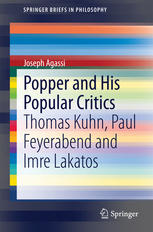

Most ebook files are in PDF format, so you can easily read them using various software such as Foxit Reader or directly on the Google Chrome browser.
Some ebook files are released by publishers in other formats such as .awz, .mobi, .epub, .fb2, etc. You may need to install specific software to read these formats on mobile/PC, such as Calibre.
Please read the tutorial at this link: https://ebookbell.com/faq
We offer FREE conversion to the popular formats you request; however, this may take some time. Therefore, right after payment, please email us, and we will try to provide the service as quickly as possible.
For some exceptional file formats or broken links (if any), please refrain from opening any disputes. Instead, email us first, and we will try to assist within a maximum of 6 hours.
EbookBell Team

4.1
90 reviewsThis volume examines Popper’s philosophy by analyzing the criticism of his most popular critics: Thomas Kuhn, Paul Feyerabend and Imre Lakatos. They all followed his rejection of the traditional view of science as inductive. Starting from the assumption that Hume’s criticism of induction is valid, the book explores the central criticism and objections that these three critics have raised. Their objections have met with great success, are significant and deserve paraphrase. One also may consider them reasonable protests against Popper’s high standards rather than fundamental criticisms of his philosophy. The book starts out with a preliminary discussion of some central background material and essentials of Popper’s philosophy. It ends with nutshell representations of the philosophies of Popper. Kuhn, Feyerabend and Lakatos. The middle section of the book presents the connection between these philosophers and explains what their central ideas consists of, what the critical arguments are, how they presented them, and how valid they are. In the process, the author claims that Popper's popular critics used against him arguments that he had invented (and answered) without saying so. They differ from him mainly in that they demanded of all criticism that it should be constructive: do not stop believing a refuted theory unless there is a better alternative to it. Popper hardly ever discussed belief, delegating its study to psychology proper; he usually discussed only objective knowledge, knowledge that is public and thus open to public scrutiny.